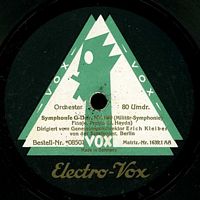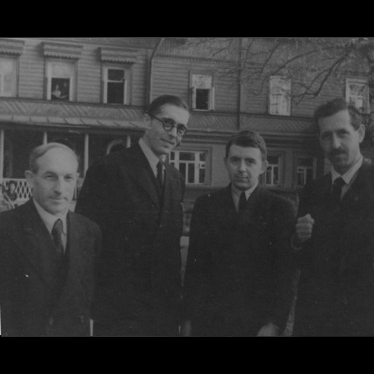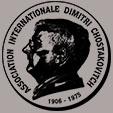Étiquette : Lucretia West
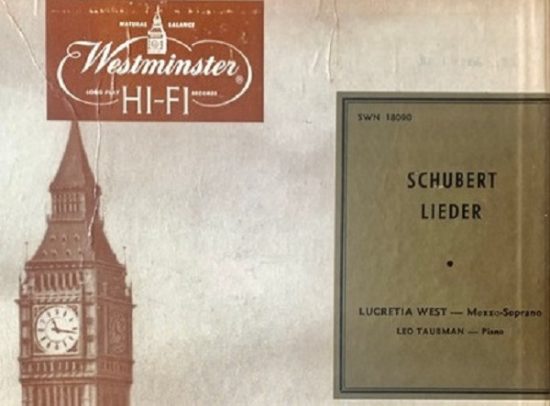
Lucretia West, mezzo-soprano Leo Taubman, piano
Schubert Lieder
An Die Musik D547 – Dem Unendlichen D291 – Wanderers Nachtlied D768
Seligkeit D433 – Die Liebe hat gelogen D751 – Rastlose Liebe D138
Der Tod und das Mädchen D531 – Wiegenlied D498 – Schlummerlied D527
Fischerweise D881 – Im Abendrot D799 – Nacht und Träume D827
Geistertanz D116 – Widerschein* D639 – Wehmut D772
Enregistrement / Recording: 1955
Source: 33t. / LP Westminster WN 18090
La cantatrice américaine Lucretia West (1922-2022) a fait l’essentiel de sa carrière en Suisse et en Allemagne. Une bourse de la ‘John Hay Whitney Fondation’ lui a permis de poursuivre ses études en Belgique et en Suisse. Elle a fait brièvement partie de la ‘New York City Opera Company’ avant de retourner en Europe en 1957 pour le reste de sa carrière. Elle a enseigné en Allemagne jusqu’en 2008 avant de retourner aux Etats-Unis.
Sa discographie officielle se limite à ses enregistrements pour la firme Wesminster notamment avec Hermann Scherchen (Mahler, Mozart) et avec accompagnement de piano, et à l’ ‘Alt-Rhapsodie’ de Brahms avec Knappertsbusch (Decca). Il existe aussi un disque de ‘Spirituals’ pour le Club Français de Disque. Quelques enregistrements radiophoniques réalisées en Europe (Schuricht, Mitropoulos) ont été publiés, mais il est possible qu’il en existe bien d’autres, notamment dans le domaine du Lied.
Bien que considérée comme une mezzo-soprano, elle avait une tessiture proche de celle d’un contralto. Le 9 juin 1958, elle a chanté à Hambourg le ‘Das Lied von der Erde’ de Mahler avec le NDR-Sinfoniker dirigé par Alfred Wallenstein (et le ténor Richard Holm), concert retransmis en direct à la radio. Un critique avait apprécié son interprétation et parlé à son sujet de ‘Bratschentimbre’ (timbre d’alto, comme l’instrument à cordes).
Le programme de ce disque entièrement consacré par une voix aussi grave à des Lieder de Schubert est en soi une rareté. Elle est ci remarquablement accompagnée par Leo Taubman (1907-1966).
* Schubert a écrit plusieurs versions de ce Lied, correspondant à des versions successives du poème. Ici, il s’agit de la 2ème version et de sa première révision. Le texte commence par «Tom lehnt harrend auf der Brücke…’
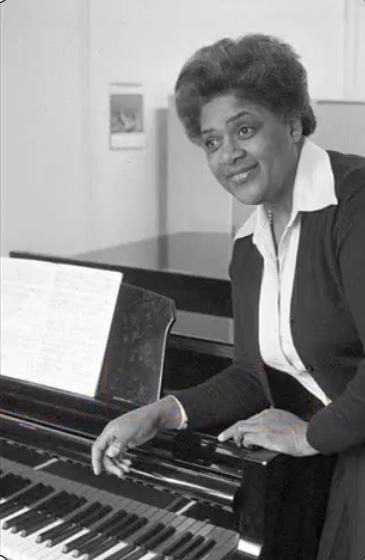
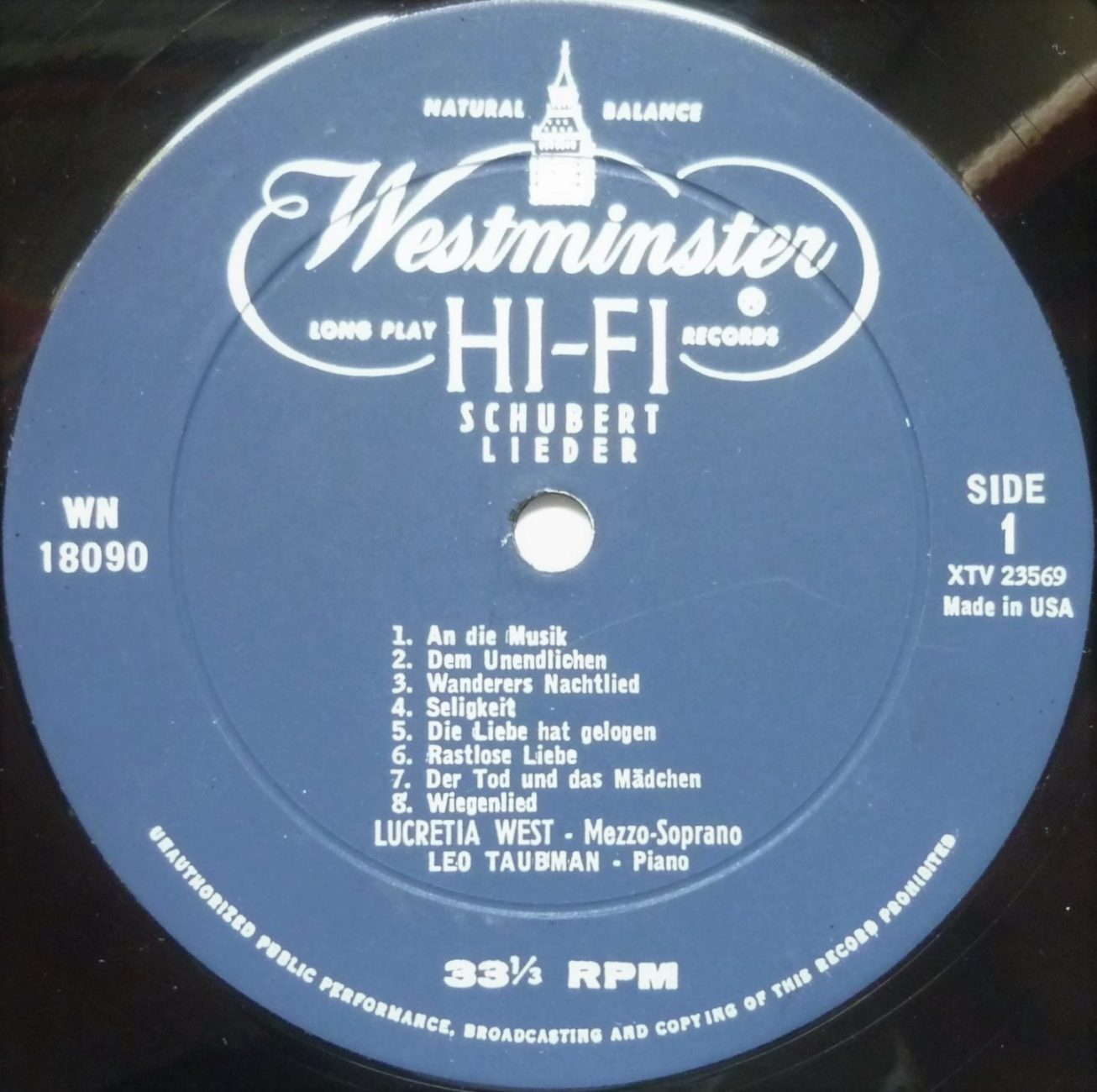
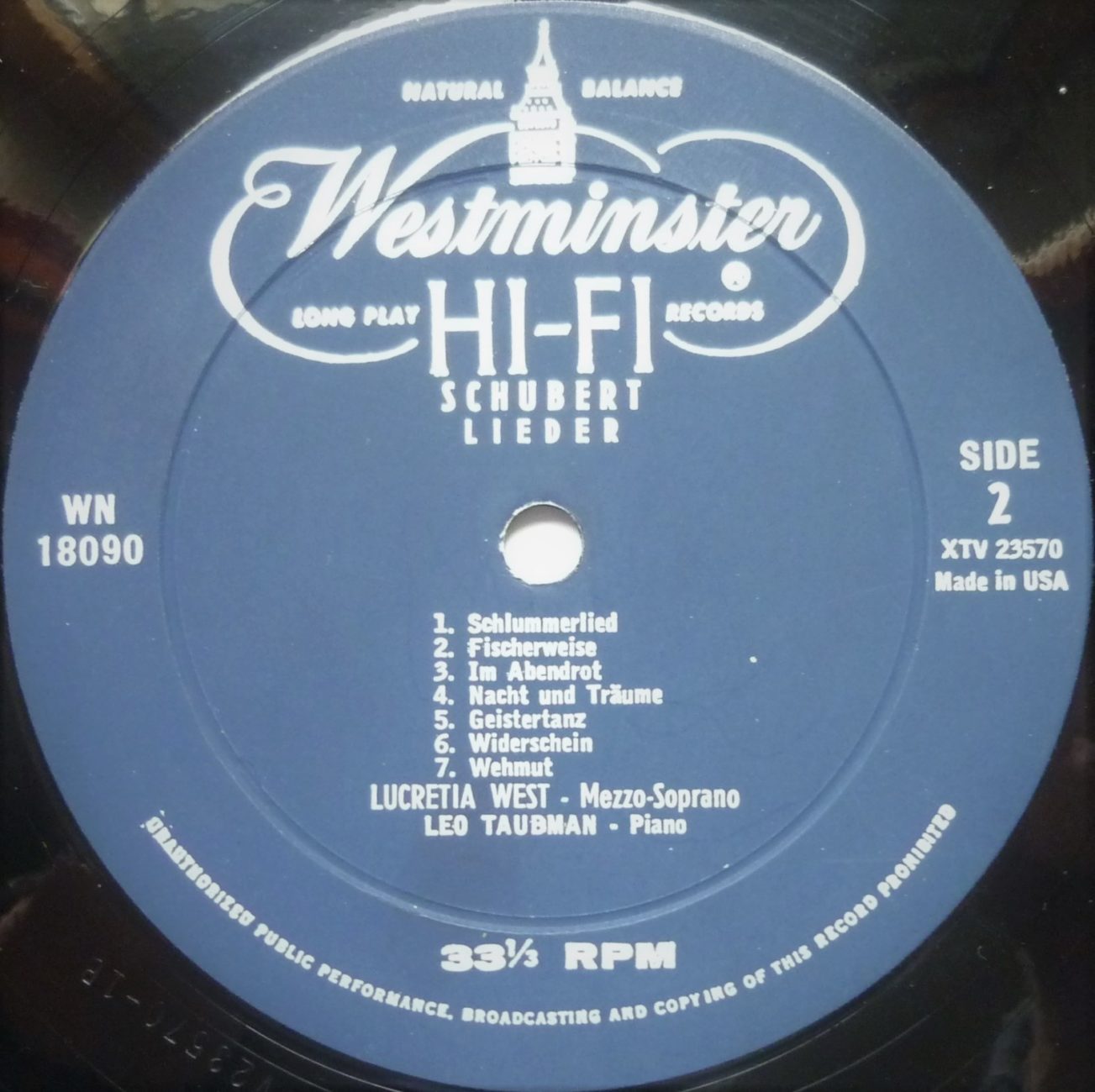
US singer Lucretia West (1922-2022) made most of her career in Switzerland and in Germany. A grant from the ‘John Hay Whitney Fondation’ allowed her to complete her studies in Belgium and in Switzerland. She was for a short period a member of the ‘New York City Opera Company’ before returning to Europe in 1957 for the remainder of her career. She taught in Germany before moving back to the United States in 2008.
Her official discography is merely comprised of her recordings for ‘Wesminster’, mainly with Hermann Scherchen (Mahler, Mozart) and with piano accompaniment, and of the ‘Alt-Rhapsodie’ by Brahms with Knappertsbusch (Decca). There also exists a LP with ‘Spirituals’ for ‘Le Club Français de Disque’. A few Radio recordings made in Europe (Schuricht, Mitropoulos) have surfaced, but it might well be that many others exist, especially with Lieder.
Although nominally a mezzo-soprano, she had a tessitura close to that of a contralto. On 9 June 1958, she sang in Hamburg Mahler’s ‘Das Lied von der Erde’ with the NDR Orchestra conducted by Alfred Wallenstein (the tenor was Richard Holm). The concert was broadcast live. A music critic then praised her performance and wrote about her of a ‘Bratschentimbre’ (viola timbre, like the string instrument).
The program of this LP entirely dedicated to Lieder by Schubert by such a low voice is a rarity in itself. She is here remarkably accompanied by Leo Taubman (1907-1966).
* Schubert wrote several versions of this Lied, corresponding to successive versions of the poem. Here, it is the second version and the first revision thereof. The text begins with the following words: «Tom lehnt harrend auf der Brücke…’

Dimitri Mitropoulos Kölner Rundfunk Sinfonie Orchester
Lucretia West, mezzo-soprano
Kölner Rundfunkchor dir: Bernhard Zimmermann
Kölner Domchor dir: Adolf Wendel
Köln Funkhaus Saal 1 – 31 Oktober 1960
Source: Bande/Tape 38 cm/s / 15 ips
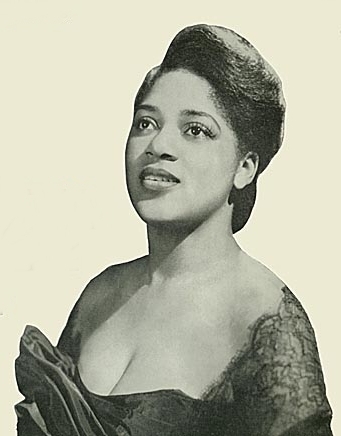
Lucretia West
Ce fut donc le dernier concert de Dimitri Mitropoulos, qui en dépit de son état de santé, s’était imposé pendant l’été et l’automne 1960 une programmation très chargée, qui est reconstituée ici pour la première fois.
Au Festival de Salzburg 1960, il donne deux concerts triomphaux (Mendelssohn Symphonie n°3, Schoenberg Variations Op.31 et Debussy La Mer le 21 août, et la Symphonie n°8 de Mahler le 28 août). Ensuite, Il dirige au Wiener Staatsoper six représentations (23, 27 et 30 septembre; 7, 12 et 15 octobre) de la Forza del Destino de Verdi qualifiées de géniales par la presse autrichienne, entrecoupées avec les Wiener Philharmoniker de deux programmes à la Musikvereinsaal, d’une part les 1 et 2 octobre (Mahler Symphonie n°9), et d’autre part les 8 et 9 octobre (Schumann Symphonie n°2, Th. Berger Jahreszeiten et Debussy La Mer). Ces deux programmes sont redonnés au cours d’une courte tournée, le 10 à Graz pour le premier, et le 11 à Linz pour le deuxième.
Il se rend ensuite à Cologne pour une série de quatre concerts avec l’Orchestre Symphonique de la WDR (Kölner Rundfunk Sinfonie Orchester).
Le premier de ceux-ci, le 24 octobre, reprend le programme salzbourgeois du 21 août avec le BPO, et le second, le 31 octobre, est donc consacré à cette Troisième de Mahler. Lors du concert du 31, il réussit à surmonter un malaise au cours du premier mouvement, mais il refuse cependant les avis pressants d’interrompre le concert après l’entracte qui suit le premier mouvement, acceptant seulement de diriger assis. En dépit de son état de fatigue extrême, il prend immédiatement après la fin du concert le train de nuit pour Milan où il doit diriger cette même Troisième le 7 novembre avec l’Orchestre de la Scala.
Le soir du 1er novembre, il rédige dans sa chambre d’hôtel milanaise une courte lettre à l’intention de l’épouse de Bruno Zirato*, Nina, qu’il poste le lendemain matin en se rendant à sa répétition avec l’Orchestre de la Scala: « Je suis ici à Milan, malheureux et mort de fatigue, et je m’inquiète de mon état de santé. Le climat de Cologne ne m’a pas fait de bien…. J’étais toujours à court de respiration. Chers amis, priez pour que je puisse retourner à New-York, et qu’ici je ne sois pas obligé d’aller à l’hôpital. Votre malheureux Dimitri ».
Le décès de Mitropoulos au cours de la répétition du 2 novembre a été rapporté dans l’ouvrage de Willam R. Trotter « Priest of Music The Life of Dimitri Mitropoulos« .
Karl O. Hoch (WDR – Leiter der Hauptabteilung Musik) annonce dans son hommage radiophonique que le chef venait d’accepter sa nomination comme Directeur Musical du Kölner Rundfunk Sinfonie Orchester. On ne connaît pas les programmes des deux autres concerts prévus à Cologne les 14 et 21 novembre.
Mitropoulos avait également des engagements à New-York avec le New-York Philharmonic et le Metropolitan Opera**. Il s’agissait tout d’abord d’un prestigieux concert supplémentaire qui avait été décidé probablement début octobre et pour lequel un accord avait été finalisé le 18 octobre: le « Pension Fund Concert » du 18 décembre avec une rencontre qui promettait d’être exceptionnelle avec le pianiste Sviatoslav Richter (Beethoven Concerto n°1 et Brahms Concerto n°2). Deux répétitions avaient été prévues le 14 et le 17 en tenant compte des engagements que Mitropoulos avait avec le Metropolitan Opera.
Le 28 octobre, le concert a été mis en location par correspondance. L’administration a été submergée par les demandes de billets, et plus de 2000 chèques ont dû être retournés aux souscripteurs. Le concert a finalement été dirigé par Bernstein et Richter a joué Liszt (Concerto n°2) et Tchaïkovski (Concerto n°1).
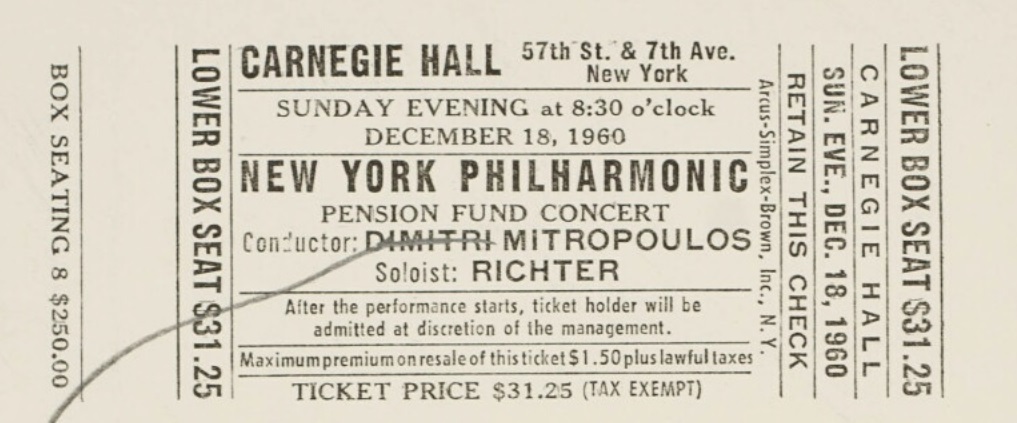
Pour la saison 1960-1961, Dimitri Mitropoulos avait des engagements pour quatre semaines de concerts successives avec le NYPO:
I – 29 et 30 décembre 1960 1er janvier 1961: Mahler Symphonie n°3 avec Martha Lipton. Le chef de chœur Hugh Ross propose de faire répéter ensemble un chœur féminin (27) du Berkshire Music Center (plutôt que la Schola Cantorum de New-York) et un chœur d’enfants (25) de la High School of Music and Art.
II – 5, 6 ,7 et 8 janvier 1961: Bach-Schoenberg Prélude et Fugue en mi mineur; Katchaturian Concerto pour violoncelle avec Rohan de Saram; Scriabine Prométhée (Poème du Feu) Op.60.
III – 12, 13, 14 et 15 janvier 1961: Mendelssohn Symphonie n°3; Krenek Medea avec Blanche Thebom; Gould Dialogues pour piano et orchestre à cordes avec Morton Gould; Skalkottas Danses Grecques.
IV – 19, 20, 21 et 22 janvier 1961: Beethoven Symphonie n°2; Berg 3 Pièces pour orchestre Op.6; Prokofiev Concerto pour piano n°3 Zadel Skolovsky; Berlioz Rob Roy, Ouverture.
Ces concerts, reprogrammés dans l’urgence, ont été assurés avec des programmes presque entièrement différents, par Stanislav Skrowaczewski pour les deux premiers et Paul Paray pour les deux suivants.
La Troisième de Mahler a été donnée plus tard, les 30 et 31 mars, et les 1 et 2 avril 1961 sous la direction de Leonard Bernstein, à la mémoire de Dimitri Mitropoulos.
Trois ans après son départ de la direction du NYPO, l’attitude de l »administration de l’orchestre à son égard avait changé. Les succès rencontrés au Met ainsi qu’en Europe (Festival de Salzburg, Wiener Staatsoper, WDR Köln) y ont vraisemblablement été pour beaucoup. Un autre indice de ce relatif rapprochement se trouve dans le fait que, pour ses concerts de l’été et de l’automne 1960, Mitropoulos avait emprunté au NYPO la partition orchestrale et le matériel d’orchestre de « La Mer » de Debussy. Après son décès, eut lieu un échange de courrier inquiet entre Joan Bonime (NYPO) et Karl O. Hoch (WDR) pour récupérer ces précieux documents, ce qui eut lieu effectivement dans les semaines qui suivirent. A noter que Mitropoulos, qui dirigeait par cœur, avait laissé la partition dans son appartement de New-York, et n’avait emmené en Europe que le matériel d’orchestre!
Les enregistrements radiophoniques qui nous restent de cette période (les deux concerts de Salzburg, la représentation de la Forza del Destino du 23 septembre au Wiener Staatsoper, la Neuvième de Mahler avec le WPO le 2 octobre et les deux concerts avec l’Orchestre de la WDR Köln avec la magnifique prestation de Lucretia West dans Mahler) sont d’inestimables documents.
* Bruno Zirato était jusqu’en 1959 l’Administrateur Général du New-York Philharmonic. Cette lettre a été publiée dans un article commémoratif signé par Bruno Zirato, inclus dans le programme du Metropolitan Opera du 5 décembre 1960. Mitropoulos avait des engagements au « Met » pour le mois de décembre, mais aucune documentation n’est disponible à ce sujet.
** Le 2 novembre, avant la représentation de Boris Godounov au « Met », l’orchestre joue sans chef la Danse des Esprits Heureux de l’ « Orfeo ed Euridice » de Gluck et Rudolf Bing s’adresse au public en ces termes: « Une autre grande tragédie a frappé le Metropolitan Opera et en fait le monde musical. Notre bien-aimé Dimitri Mitropoulos est décédé ce matin à Milan. Vous l’aimiez tous et vous savez qu’il était un des grands musiciens et un des grands chef d’orchestre de notre temps, ainsi qu’un extraordinaire être humain. Sa perte est personnellement ressentie par chacun au Metropolitan – en fait tous les membres de cet orchestre étaient ses amis. Bien sûr le Metropolitan Opera va continuer et d’autres grands chefs pourraient aller et venir, mais il y aura toujours dans nos cœurs une place spéciale pour Dimitri Mitropoulos «
__________________
This was Dimitri Mitropoulos’ last concert. In spite of his health condition, he drove himself hard during the summer and the autumn of 1960 with a heavy schedule, reconstructed here for the first time.
At the 1960 Salzburg Festival, he gives two triumphal concerts (Mendelssohn Symphony n°3, Schoenberg Variations Op.31 and Debussy La Mer on August 21, and Mahler Symphony n°8 on August 28). Then, he conducts at the Wiener Staatsoper six performances (September 23, 27 and 30 and October 7, 12 and 15) of Verdi’s « La Forza del Destino » de Verdi considered by the Austrian press as a stroke of genius, interleaved with two programs at the Musikvereinsaal with the Wiener Philharmoniker on the one hand on October 1 and 2 (Mahler Symphony n°9), and on the other hand on October 8 and 9 (Schumann Symphony n°2, Th. Berger Jahreszeiten and Debussy La Mer). These two programs are performed again during a short tour on October 10 in Graz for the first one, and on October 11 in Linz for the second.
Thereafter, he travels to Cologne for a series of four concerts with the WDR Sinfonie Orchester (Kölner Rundfunk Sinfonie Orchester).
The first of them, on October 24, has the same program as the BPO August 21 Salzburg concert, and the second, on October 31, is then dedicated to the Mahler’s Third. During the October 31 concert, he succeeds in overcoming a stroke during the first movement, but however refuses the urging advices against resuming the concert after the intermission following the first movament, only accepting to conduct seated. After the end of the performance, in spite of his high state of exhaustion, he takes the night train to Milan where he is to conduct that same Third Symphony with La Scala Orchestra on November 7.
On the evening of November 1st, he writes in his Milan hotel room a short letter to Bruno Zirato’s wife*, Nina, which he mails the next morning while going to his rehearsal with the Scala Orchestra: « Here I am in Milano. I am miserable, dead tired, and I am worried over the state of my health. The climate in Cologne did me no good…. I was always short of breath. Dear friends, please pray that I will be able to return to New York, and not be forced to enter a hospital here. Your unhappy Dimitri ».
Mitropoulos’ death during the November 2 rehearsal has been told in Willam R. Trotter’s book « Priest of Music The Life of Dimitri Mitropoulos« .
Karl O. Hoch (WDR – Leiter der Hauptabteilung Musik) announces in his broadcast tribute that the conducter has accepted to become Music Director of the Kölner Rundfunk Sinfonie Orchester. The programs of the other two Cologne concerts on November 14 and 21 are not known.
Mitropoulos was also to perform in New-York with the New-York Philharmonic and the Metropolitan Opera**. Firstly, it was a prestigious supplementary concert that was probably decided at the beginning of October and for which an agreement was finalized on October 18: the December 18 « Pension Fund Concert » with an exceptionally promising meeting with pianist Sviatoslav Richter (Beethoven Concerto n°1 and Brahms Concerto n°2). Two rehearsals were set on December 14 and 17 to take care of Mitropoulos’ schedule with the Metropolitan Opera.
On October 28, a mail order was launched. The administration was overflooded with orders for tickets and more than 2,000 cheques had to be returned to subscribers. The rescheduled concert was conducted by Bernstein and Richter played Liszt (Concerto n°2) and Tchaïkovski (Concerto n°1).

For the 1960-1961 season, Dimitri Mitropoulos was to perform during four successive weeks with the NYPO:
I – December 29 and 30, 1960 and January 1st, 1961: Mahler Symphony n°3 with Martha Lipton. Choir director Hugh Ross suggested to make joint rehearsals with a women choir (27) from the Berkshire Music Center (rather than from the Schola Cantorum of New York) and a children choir (25) of the High School of Music and Art.
II – January 5, 6 ,7 and 8, 1961: Bach-Schoenberg Prelude and Fugue in E flat; Katchaturian Cello Concerto with Rohan de Saram; Scriabin Prometheus (Poem of Fire) Op.60.
III – January 12, 13, 14 and 15, 1961: Mendelssohn Symphony n°3; Krenek Medea with Blanche Thebom; Gould Dialogues for piano and string orchestra with Morton Gould; Skalkottas Greek Dances.
IV – January 19, 20, 21 and 22, 1961: Beethoven Symphony n°2; Berg 3 Orchestra Pieces Op.6; Prokofiev Piano Concerto n°3 Zadel Skolovsky; Berlioz Rob Roy, Overture.
These concerts, hastily rescheduled, were given with almost entirely different programs by Stanislav Skrowaczewski for the first two and Paul Paray for the next two.
The Mahler Third was performed later on March 30 and 31 and on April 1 and 2, 1961 under the direction of Leonard Bernstein, in Memory of Dimitri Mitropoulos.
Three year after he left the NYPO as its Music director, the administration of the orchestra saw him differently. His success at the Met as well as in Europe (Salzburg Festival, Wiener Staatsoper, WDR Köln) were most certainly very instrumental. Another sign of this better relationship may be found in the fact that, for his 1960 summer and autumn concerts, Mitropoulos borrowed to the NYPO the orchestral score and the orchestral parts of « La Mer » by Debussy. After his death, an anxious exchange of letters took place between Joan Bonime (NYPO) and Karl O. Hoch (WDR) to get back these precious documents, which successfully happened during the next weeks. It is worth noting that Mitropoulos, who conducted by heart, left the orchestral score in his New York flat, and only brought with him to Europe the orchestral parts!
The broadcast recordings that have survived from that period (both Salzburg concerts, the Wiener Staatsoper performance of La Forza del Destino on September 23, the Mahler Ninth with the WPO on October 2 and both WDR Köln concerts, including Lucretia West beautifully singing Mahler) are as many historical documents.
* Bruno Zirato was until 1959 the General Manager of the New-York Philharmonic. This letter was published as part of a tribute signed by Bruno Zirato, in the December 5, 1960 program of the Metropolitan Opera. Mitropoulos was to conduct at the « Met » during the month of December, but it is not documented.
** On November 2, before the performance of Boris Godounov at the « Met », the orchestra plays without a conductor the Dance of the Blessed Spirits from « Orfeo ed Euridice » by Gluck and Rudolf Bing talks to the public with these words: « Another great tragedy has befallen the Metropolitan Opera and indeed the musical world. Our beloved Dimitri Mitropoulos died this morning in Milan. You all loved him, and you know he was one of the great musicians and great conductors of our time, and also an outstanding human being. His loss is felt personally by everyone at the Metropolitan – indeed all the members of this orchestra were his friends. Naturally the Metropolitan Opera will go on and other great conductors may come and go, but there will always be a very special place in our hearts for Dimitri Mitropoulos.«
Les liens de téléchargement sont dans le premier commentaire. The download links are in the first comment.

